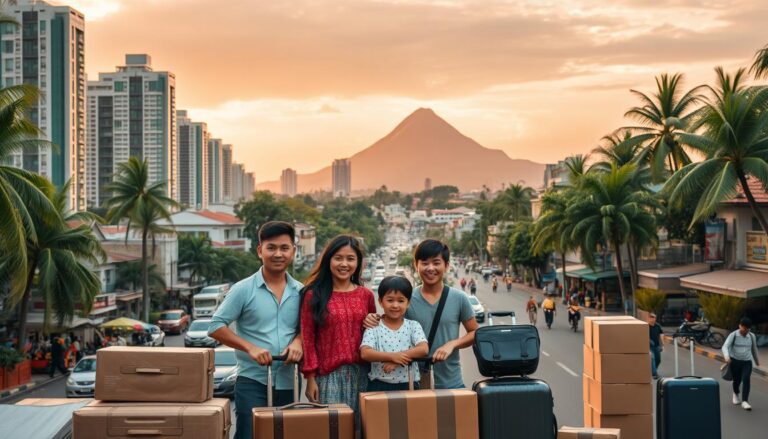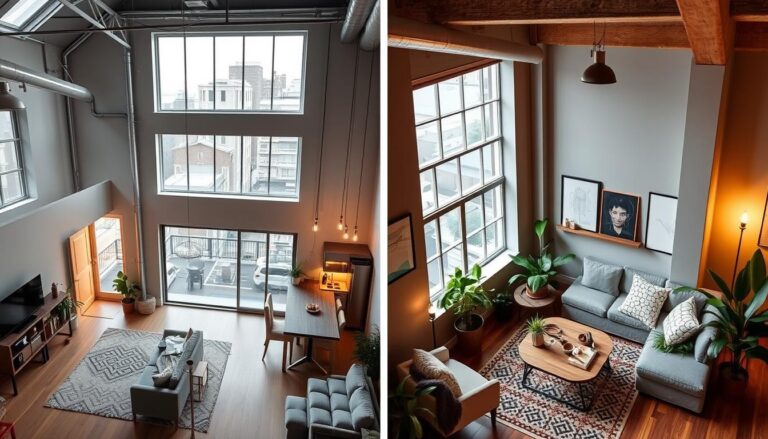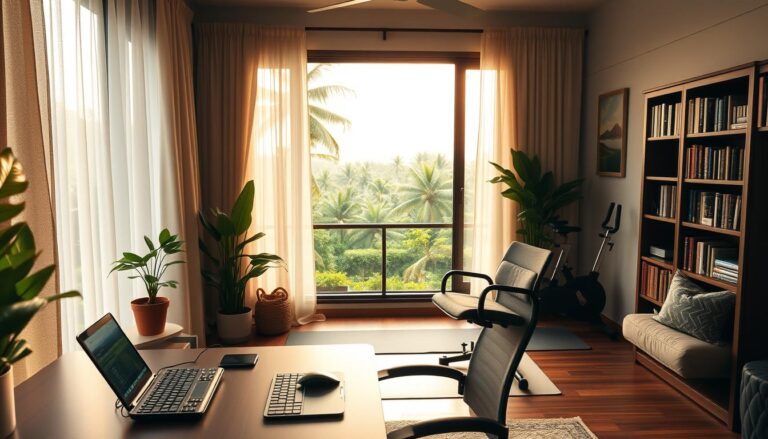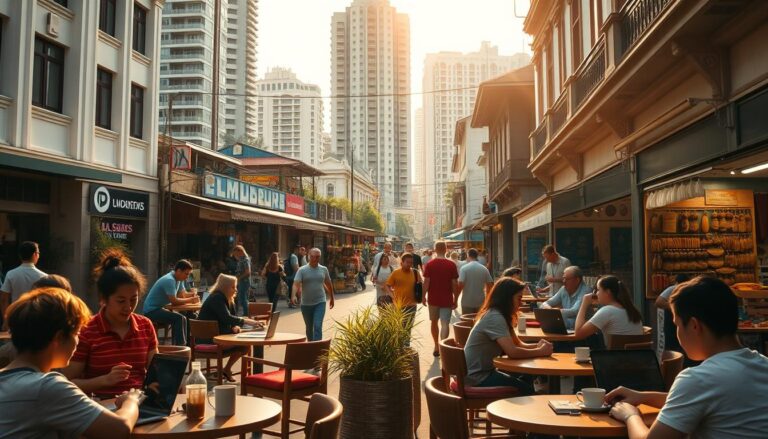UK Remote Worker Moves to the Philippines: Checklist
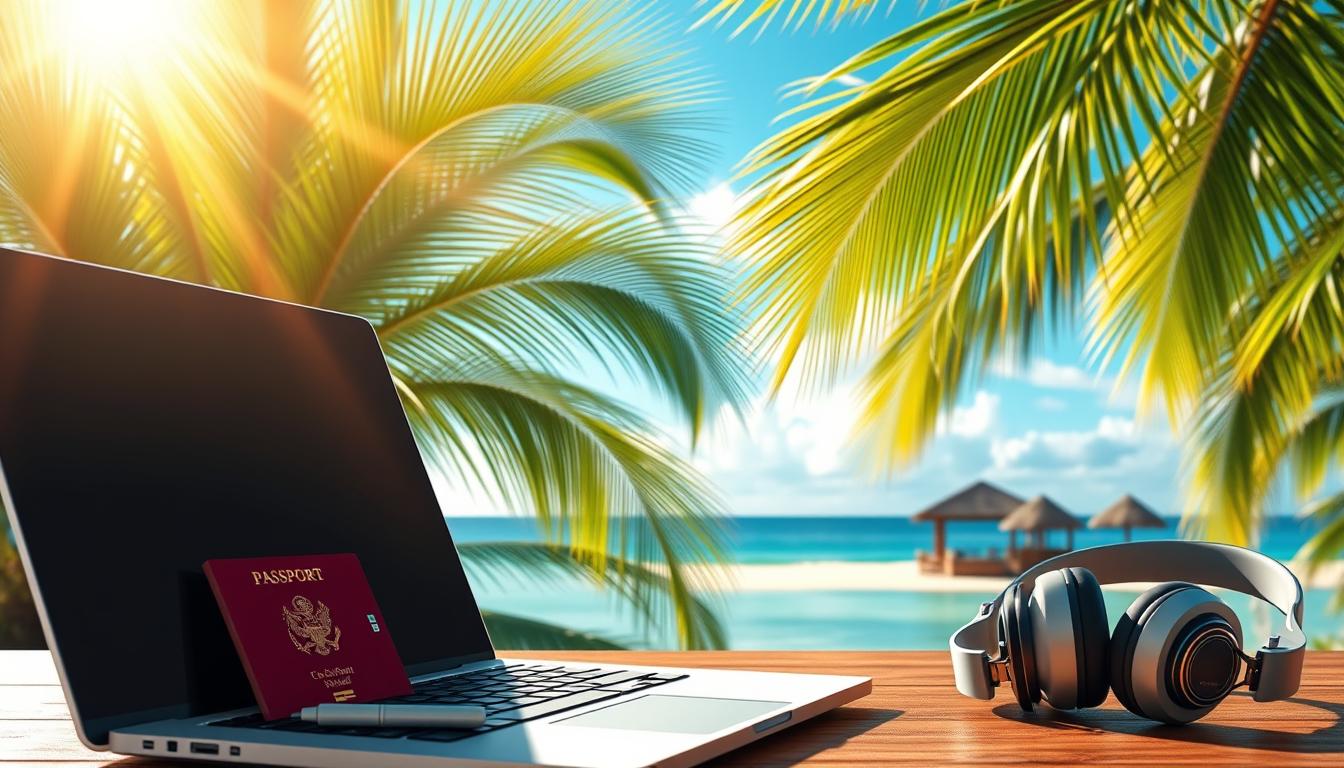
Dreaming of trading your office view for white sandy beaches? This guide is your first step. We created a complete roadmap for professionals looking to make a major life change.
The archipelago nation offers a friendly culture where English is widely spoken. This makes settling in much easier. You can enjoy a humid equatorial climate with bustling cities and lush jungles.
This checklist covers everything from initial planning to integrating into the local community. We provide real data on costs and visa timelines. Our goal is to help you avoid common pitfalls.
Whether you are a freelancer or a company employee, this guide is for you. It will help you navigate the complexities of international remote work. Your transition to this beautiful Southeast Asian country can be smooth and rewarding.
Key Takeaways
- The Philippines is an attractive destination for its low cost of living and English-speaking population.
- A new digital nomad visa is planned, allowing for extended stays for eligible professionals.
- Understanding the difference between working for a foreign employer versus a local one is crucial.
- Proper planning for visas, finances, and workspace setup is essential for a successful move.
- Reliable internet and choosing the right location are key factors for a digital nomad.
- This guide provides a step-by-step checklist to ensure a legal and organized relocation.
Planning Your Remote Work Transition to the Philippines
Before embarking on your overseas adventure, thorough organization ensures a smooth transition to your new tropical base. The initial planning phase covers two critical areas: legal entry requirements and financial preparation.
Assessing Visa Options and Eligibility
Understanding your legal entry options is the first step. The archipelago offers different pathways depending on your stay duration and employment status.
Tourist visas provide short-term access, while the anticipated digital nomad visa caters to longer stays. Each category has specific eligibility requirements you must meet.
| Visa Type | Initial Duration | Income Requirement | Renewal Options |
|---|---|---|---|
| Tourist Visa | 30-59 days | None | Extensions available |
| Digital Nomad Visa | 12 months | $24,000 annually | 12-month renewal |
| Work Permit | Varies | Local employment | Employer-dependent |
Budgeting for the Move and Cost of Living
Financial planning requires calculating both relocation costs and ongoing expenses. Your income should comfortably cover all aspects of life in this beautiful country.
Basic monthly living expenses average around $500 before accommodation. Rental costs range from $325 outside metro areas to over $1,500 in central locations.
The proposed digital nomad visa requires proof of sufficient income. This ensures you can maintain your lifestyle while contributing positively to the local economy.
Navigating Visa and Immigration Requirements
Understanding the Philippine immigration system requires careful consideration of your work situation. Each pathway offers different benefits and restrictions for international professionals.
Comparing Tourist, Digital Nomad, and Work Permits
Tourist visas provide the simplest entry for many citizens. These typically grant 30-59 days upon arrival and can be extended.
The upcoming digital nomad visa caters specifically to remote workers. It offers 12-month stays without local tax obligations on international income.
| Visa Type | Best For | Maximum Stay | Tax Requirements |
|---|---|---|---|
| Tourist Visa | Short exploratory trips | 24-36 months with extensions | Not applicable |
| Digital Nomad Visa | Remote workers with foreign employers | 12 months, renewable | No local income tax |
| Work Permit | Employment with local companies | Employer-dependent | Full local taxation |
Understanding Application Timelines and Fees
The digital nomad visa application process is expected to take 2-3 months. You should apply well before your planned move date.
Fees will likely start around $250 based on comparable visa categories. The Bureau of Immigration will probably use an online portal for submissions.
Many applicants begin with a tourist visa while their long-term application processes. This strategy ensures legal residence during the waiting period.
UK Remote Worker Moves to the Philippines: Essential Checklist
Before you can enjoy the tropical lifestyle, you’ll need to assemble a comprehensive application package. This checklist covers the critical documents that prove your eligibility for long-term residence.
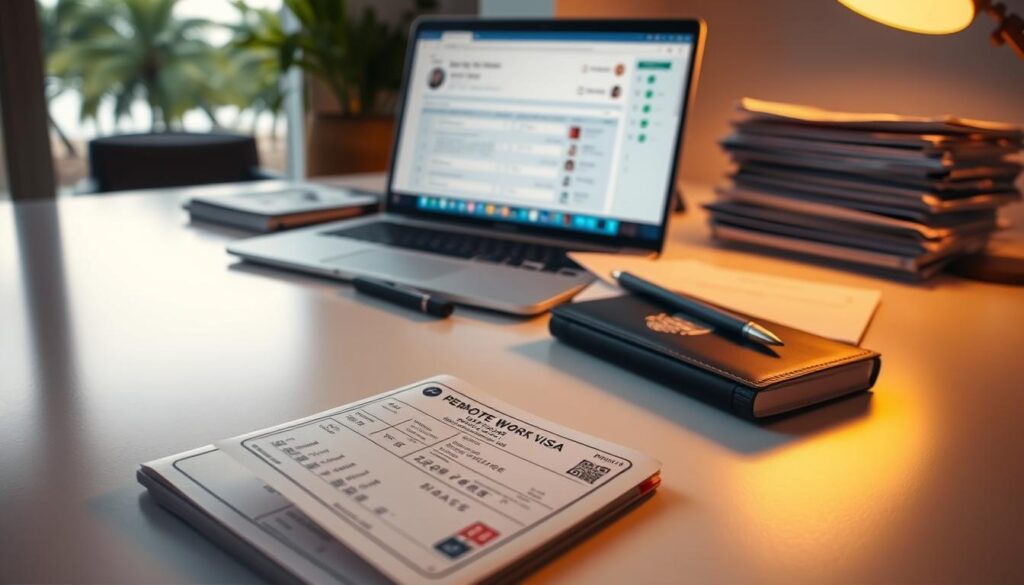
Minimum Income and Employment Documentation
The anticipated digital nomad visa requires proof of stable income from foreign sources. You must demonstrate at least $24,000 annually through employment contracts or financial statements.
Your employment status determines the specific documentation needed. Employees need a detailed letter from their employer confirming remote work approval and salary details.
Freelancers should provide client agreements showing consistent income. The application process has strict requirements for verifying your financial stability.
Health insurance covering your entire stay is mandatory. You’ll also need a clean criminal record certificate authenticated for international use.
Additional practical items include passport validity and accommodation proof. These documents ensure a smooth transition to your new work environment.
Setting Up Your Remote Work Environment in the Philippines
Your ability to work productively from this Southeast Asian nation hinges on creating a stable digital workspace. A reliable setup is non-negotiable for maintaining productivity.
Connectivity presents the biggest challenge. The country ranks 103rd globally for average internet speed.
Finding Reliable Internet and Coworking Spaces
Major cities like Manila offer the strongest infrastructure. Smaller islands experience frequent service drops.
This makes choosing your base critical. You need a plan for consistent internet access.
| Connection Type | Average Speed | Reliability | Monthly Cost |
|---|---|---|---|
| Home Broadband | ~29 Mbps | Good in cities | ~$40 |
| Mobile Data (SIM) | Varies | Backup option | ~$10-20 |
| Coworking Space | Often higher | Excellent | Varies by location |
Coworking spaces provide professional environments with backup connections. They are ideal for those who need to work remotely without worry.
Manila features established spots like Acceler8 and Work Folk. Cebu offers Nomads Hub, while Davao has affordable options like RainMakers.
Always have a backup mobile data plan from providers like Smart or Globe. This ensures you can stay online during important meetings.
Living Costs and Accommodation Options in the Philippines
Creating a realistic budget is your first step toward enjoying island life. Your monthly income needs to cover both basic living expenses and housing costs comfortably.
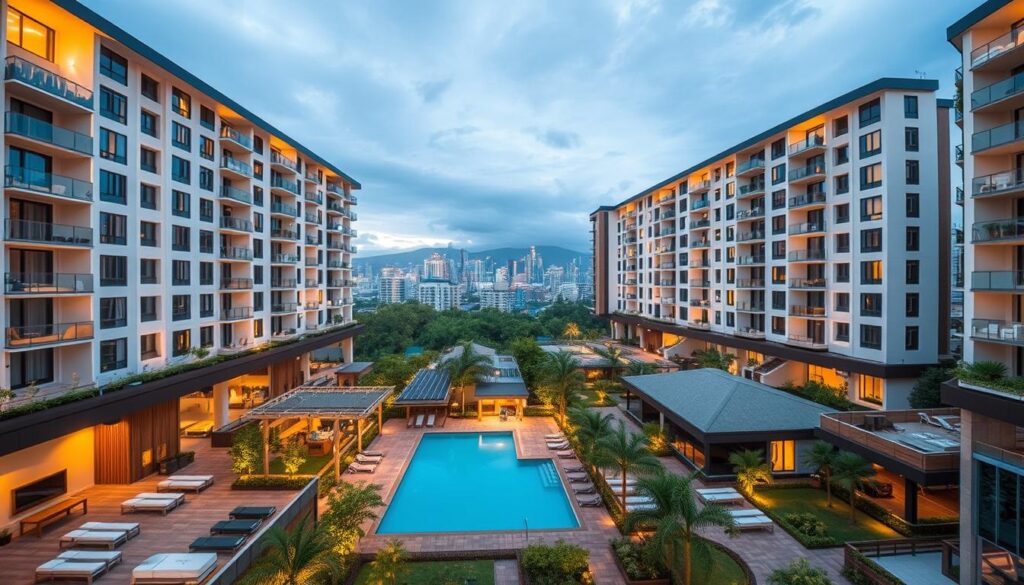
Basic monthly expenses average around $500 before rent. This includes groceries, utilities, and daily meals.
Overview of Monthly Living Expenses
Daily costs are surprisingly affordable. A satisfying lunch costs about $3.50, while a nice restaurant meal runs $10-$15.
Groceries typically cost $100-$150 monthly when mixing local and imported items. Utilities add another $100, with electricity being the largest expense.
| City | 1-Bedroom Apartment | 3-Bedroom Apartment | Cost of Living Tier |
|---|---|---|---|
| Manila | $575 | $1,500 | Premium |
| Cebu | $465 | $465 | Mid-Range |
| Davao | $260 | $650 | Budget-Friendly |
As a foreign employee working remotely, you avoid local income tax obligations. However, you’ll pay 12% VAT on purchases.
Choosing your accommodation location significantly impacts your budget. Your income stretches further in provincial areas compared to major cities.
Planning for several months of expenses ensures a smooth transition. This beautiful country offers excellent value for remote professionals.
Embracing the Local Culture and Digital Nomad Community
Beyond the practical logistics, immersing yourself in the local culture creates the most rewarding part of the digital nomad journey. This beautiful country offers a welcoming environment where English is widely spoken.
Building connections transforms your experience from isolated to deeply enriching. The established community of international professionals provides valuable support.
Discovering Popular Digital Nomad Hotspots
Manila serves as the primary hub for digital nomads with excellent amenities. The city features a large young expat community working alongside local entrepreneurs.
Cebu offers a balance between urban comforts and tropical beaches. This attracts many young professionals creating a thriving nomad scene.
Davao provides a more authentic local experience with fewer expats. It maintains decent internet while offering genuine cultural immersion.
Siargao has emerged as a premier destination for surfing nomads. The island attracts an international community that blends ocean adventures with remote work.
Networking with Expats and Remote Workers
Regular networking events occur in major cities like Manila and Cebu. These gatherings help remote workers connect and share experiences.
Building relationships with both international and local workers opens doors to collaborative opportunities. The friendly culture makes social integration remarkably accessible for new nomads.
Your experience in this diverse country becomes truly fulfilling through community connections. The welcoming environment supports both professional growth and personal enrichment.
Managing Taxes, Employment, and Legal Considerations
Tax compliance represents one of the most complex challenges for professionals working across borders. Understanding your obligations helps you avoid costly mistakes and legal issues.
The digital nomad visa offers significant benefits for tax planning. Holders are exempt from local income tax on international earnings.
Handling Multi-Country Tax Obligations
The six-month rule is critical for establishing tax residency. Staying in any country for this period may trigger local tax obligations.
Double taxation becomes a risk when earning from foreign employers. Proper documentation ensures you only pay taxes in one jurisdiction.
Working for local companies requires an Alien Employment Permit. This process involves your employer petitioning on your behalf.
Leveraging Management Services for Smooth Transitions
Management companies provide innovative solutions for international professionals. They act as intermediaries between you and foreign employers.
This arrangement eliminates the need for complex work visa requirements. You become a local employee of the management firm.
The service handles all tax withholding and provides health insurance benefits. This simplifies the entire employment process for fully remote workers.
Conclusion
Embarking on a journey as a digital nomad in this island nation is an achievable dream with the right preparation. This guide has provided a complete roadmap, from understanding visa options like the upcoming digital nomad visa to setting up a productive remote work environment.
The benefits are substantial. You can enjoy an affordable cost of living, a welcoming culture, and stunning natural beauty. Proper planning for taxes, income verification, and reliable internet ensures a smooth transition.
While the process requires attention to detail, the reward is a fulfilling lifestyle. You can work remotely from a vibrant country while growing both personally and professionally. Your adventure awaits.
FAQ
What are the main visa options for a digital nomad wanting to work remotely from the Philippines?
How much income do I need to prove to live comfortably as a remote worker in the Philippines?
FAQ
What are the main visa options for a digital nomad wanting to work remotely from the Philippines?
The primary options include extending a tourist visa for up to 36 months, applying for a Special Resident Retiree’s Visa (SRRV) if you meet age and financial requirements, or securing a traditional work permit if employed by a local company. A specific digital nomad visa is not yet available, so most remote workers use the tourist visa route.
How much income do I need to prove to live comfortably as a remote worker in the Philippines?
While there’s no official minimum income requirement for a tourist visa, a monthly income of
FAQ
What are the main visa options for a digital nomad wanting to work remotely from the Philippines?
The primary options include extending a tourist visa for up to 36 months, applying for a Special Resident Retiree’s Visa (SRRV) if you meet age and financial requirements, or securing a traditional work permit if employed by a local company. A specific digital nomad visa is not yet available, so most remote workers use the tourist visa route.
How much income do I need to prove to live comfortably as a remote worker in the Philippines?
While there’s no official minimum income requirement for a tourist visa, a monthly income of $1,500 to $2,000 is generally recommended for a comfortable lifestyle. This budget covers nice accommodation, reliable internet, food, transportation, and leisure activities, allowing you to enjoy the country without financial stress.
Is the internet reliable enough for video calls and remote work in popular nomad areas?
Yes, in major digital nomad hotspots like Manila, Cebu, and Siargao, you can find excellent fiber internet connections. Many coworking spaces and condominiums offer high-speed plans suitable for video conferencing and large file transfers. It’s wise to have a local mobile data plan as a backup for maximum reliability.
What are the tax implications for a UK citizen working remotely for a foreign company while living in the Philippines?
If you stay in the country for less than 183 days in a calendar year, you are typically considered a non-resident and are not liable for Philippine income tax on your foreign-sourced earnings. However, you should consult a tax professional to understand your ongoing obligations in the UK and ensure full compliance.
How easy is it to find community and network with other expats and remote workers?
A> It’s very easy! The digital nomad community is thriving. Cities like Cebu and Makati have active expat groups and numerous coworking spaces that host regular networking events, workshops, and social gatherings. You can quickly build a strong social and professional network through platforms like Facebook and Meetup.
Can my employer’s HR department help with the visa process and legal requirements?
A> If you are a full-time employee, your company’s HR team may assist with documentation like employment verification letters. However, the actual visa application and immigration process is your personal responsibility. For a smoother transition, many nomads use specialized relocation or management services that handle the bureaucratic details.
,500 to ,000 is generally recommended for a comfortable lifestyle. This budget covers nice accommodation, reliable internet, food, transportation, and leisure activities, allowing you to enjoy the country without financial stress.
Is the internet reliable enough for video calls and remote work in popular nomad areas?
Yes, in major digital nomad hotspots like Manila, Cebu, and Siargao, you can find excellent fiber internet connections. Many coworking spaces and condominiums offer high-speed plans suitable for video conferencing and large file transfers. It’s wise to have a local mobile data plan as a backup for maximum reliability.
What are the tax implications for a UK citizen working remotely for a foreign company while living in the Philippines?
If you stay in the country for less than 183 days in a calendar year, you are typically considered a non-resident and are not liable for Philippine income tax on your foreign-sourced earnings. However, you should consult a tax professional to understand your ongoing obligations in the UK and ensure full compliance.
How easy is it to find community and network with other expats and remote workers?
A> It’s very easy! The digital nomad community is thriving. Cities like Cebu and Makati have active expat groups and numerous coworking spaces that host regular networking events, workshops, and social gatherings. You can quickly build a strong social and professional network through platforms like Facebook and Meetup.
Can my employer’s HR department help with the visa process and legal requirements?
A> If you are a full-time employee, your company’s HR team may assist with documentation like employment verification letters. However, the actual visa application and immigration process is your personal responsibility. For a smoother transition, many nomads use specialized relocation or management services that handle the bureaucratic details.

